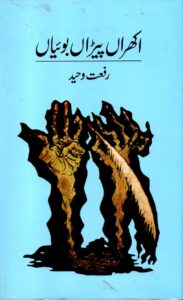
Zahid Rabbani
The Punjabi poetry book ‘Akhraan Peeraan Boyeeyan’ written by Riffat Waheed starts with a dedication to her late son Abdullah. This gives an initial sense of what the book is. The rest of the book comprising ghazals is broken down into musings that deal with various facets of life.
Aspects of culture and spirituality also form fabrics for her verses in the collection. The writing style is also similar across the board and there is a lot of intensity in the use of words that denote passions.
Together, they cause the reader to reevaluate her conception of love in all its forms, the lover, the mother, the child, acceptance of self, and love for and from an omniscient God, numerous sweethearts in her life, including her family.
Riffat is innovative and spontaneous as a poet. She highlights the issues of the downtrodden throughout her poetry. Punjabi poetry is famous for two themes: mysticism and romanticism.
To these Riffat has added elements of defiance, optimism, courage, and hope. In her poetry, humanity reigns supreme and according to her, there is nothing in the world, which can defeat the human spirit.
The force of her Punjabi identity is so strong in her poetry that its pull is not lost on the readers. Her emotions, responses, and every related expression are the result of her Punjabi sensibility and connectivity. She lives and relives in her mother language with all its colorful and holistic manifestations. All the pains and pleasures of the river of life flow inside her poetry.
Riffat Waheed’s worth as a contemporary Punjabi poet lies, as much in what she is as in what she is not. She is not a fabricator of myths, nor a seller of nostalgic fables.
The book displays the thoughts of the poet, attractive Punjabi culture, themes of love, feminism, and a ray of hope in the darkness of hopelessness. She does speak patronizingly of the disenfranchised, romanticizes their poor existence.
Riffat Waheed does tune her poetry to make ethically correct music: to announce her arrival she does beat her breast over gender injustice, caste atrocities, class oppression, and racist imperialism.
She is a wakeful seer, not an escapist dreamer. She does dream, however in a way that is awake to the nightmares lurking in feelings. Even thirst for admiration, an apparently harmless pastime of many Punjabi writers, fails to attract this thinking dreamer.
Riffat Waheed does not leave even the back door of her poetry open to let slip in those despicable typecasts that corrode the ambiance of some of the finest modern poetry in Punjabi.
The themes that breathe in her verses are the portrayals of life. The ethos that pulsates in her verses reflects an honest understanding of the human race in the society they live in.
 Pride News Daily NEWS
Pride News Daily NEWS





